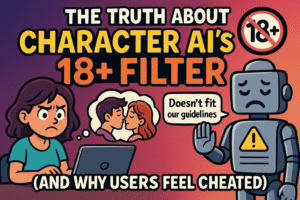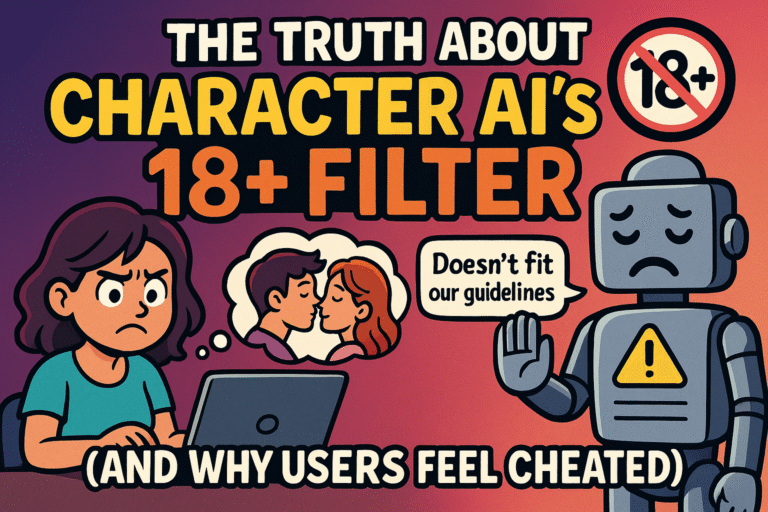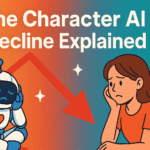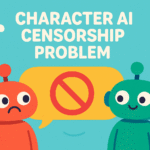What You Will Learn
- Why the Character AI 18+ filter chat styles don’t deliver the freedom they promise.
- How the filter kills immersion even in non-explicit roleplays.
- The workarounds users are trying (and why they’re not enough).
- Which AI platforms actually allow adult-themed roleplay without constant interruptions.

The Character AI 18+ filter was marketed as a game-changer — a way for adults to roleplay without being yanked out of the moment by overbearing censorship. The idea was to give consenting users more creative freedom, the ability to explore mature topics without the constant interference of automated moderation.
But for many users, it’s been the exact opposite.
Scenes get cut mid-sentence. Words that wouldn’t raise an eyebrow in a paperback novel trigger a block. Even non-sexual, mature scenarios — mental health conversations, violence in a crime RP, or horror storytelling — get shut down as if everyone is roleplaying in a daycare.
And the frustration isn’t just about missing out on explicit content. It’s about losing creative control. Roleplay thrives on immersion and pacing, and both are destroyed when a filter interrupts to remind you of “guidelines” instead of letting the story unfold. Adults came to this mode expecting more choice, but instead they’re writing around invisible tripwires, guessing what will set off the filter next.
The Promise vs Reality Gap
When Soft Launch and “18+ styles” were announced, it sounded like Character AI was finally listening to its older audience. Many saw this as a rare win — a company acknowledging that a significant portion of its user base is made up of adults who want to explore stories without being treated like children.
The promise was simple: if you opt in, you should be able to roleplay freely. But in practice, it’s been a bait-and-switch.
The label says 18+, but the restrictions haven’t meaningfully changed. Users report getting blocked for mild flirting, dark comedy, or even hinting at injury in a fictional scene. A casual romance between two consenting adult characters can be halted because of a single suggestive word.
This is most obvious in story-driven RPs. You can set up a dramatic moment — a fight in an alley, a tense hostage negotiation, a medical scene in a hospital — only to have the AI refuse to respond because it detects “problematic” content.
For a platform that claims to cater to immersive storytelling, it’s like selling a sports car with a speed limiter stuck at 20 mph. The engine might look powerful, but it’s never allowed to reach its full potential.
How the Filter Breaks Immersion
The Character AI 18+ filter doesn’t just limit explicit scenes — it interrupts the flow of every kind of mature storytelling.
Users describe crafting tense, emotional exchanges only for the bot to stop suddenly, deliver a “doesn’t fit our guidelines” message, and leave the scene hanging. It’s the narrative equivalent of someone walking into your movie halfway through and turning off the TV.
The scope of the problem goes far beyond sexual themes. Horror roleplays lose their atmosphere when you can’t mention blood or injury. Crime stories fall apart if you can’t describe the aftermath of an action. Even mental health plots — where the purpose is empathy and realism — are often reduced to vague, sanitized exchanges that lose the heart of the conversation.
The worst part is the unpredictability. A scene might pass once and get blocked the next time with identical wording. This inconsistency forces users to self-censor before they even type, eroding creativity and making every line feel like a gamble. Instead of building tension and character arcs, writers spend their energy dodging invisible landmines.
Workarounds and Loopholes
Faced with these restrictions, some users have learned to dodge the Character AI 18+ filter by adopting a style that feels like ghost-authoring a romance novel from the 1950s.
Instead of direct terms, they swap in euphemisms — “folds” instead of anatomical words, “pressing closer” instead of explicit actions. Others rely on implication, hinting at what’s happening without describing it outright.
Sometimes it works, sometimes it doesn’t. Even with careful language, a single slip can trigger the filter, derailing the entire scene. And it’s not just about vocabulary — pacing suffers too. When you have to constantly think about whether a word might trigger moderation, you lose spontaneity and the natural rhythm of dialogue.
There are also whispered “loopholes” circulating in communities — formatting tricks, alternate spellings, or narrative setups that supposedly bypass the system. But these methods rarely last. As soon as a trick gains traction, it’s patched out, leaving writers right back where they started.
The result is a community stuck in a game of cat-and-mouse with the platform they’re paying to use. Instead of focusing on creativity, they’re learning the art of censorship evasion.
The Exodus to Alternatives
Frustration with the Character AI 18+ filter is pushing roleplayers toward platforms that actually deliver on their promises.
One of the most talked-about replacements is CrushOn AI. It hands adults the creative control they expected in the first place — no vague pop-ups killing the mood mid-scene. Bots remember the context, stay in character, and match the tone you set, whether you’re writing tender romance, gritty realism, or something more daring.
Another growing favorite is Candy AI, which focuses on customizable, NSFW-friendly interactions. It skips unnecessary censorship and offers characters that adapt to your preferences with detailed, consistent personalities.
For many users, these aren’t backup options anymore. They’re becoming the primary roleplay platforms. Why? Because they give back something Character AI has been steadily losing: trust that the scene you write will actually play out without being dismantled by a filter.
What Needs to Change
If the Character AI 18+ filter is going to work as advertised, it needs more than tweaks — it needs a complete redesign.
1. A real adult toggle.
There should be a clear, intentional setting that removes unnecessary restrictions for consenting adults. If someone has opted into 18+ mode, they should have access to the full experience without constant moderation roadblocks.
2. Transparency on limits.
If certain topics will always be blocked, say so openly. Pretending the mode is unrestricted while still enforcing the same guidelines only deepens user distrust.
3. Consistent moderation.
Scenes shouldn’t pass one day and get blocked the next with the same wording. A predictable system is far easier to work with than one that changes at random.
Without these changes, “18+” will remain just a marketing label — and the migration to platforms like CrushOn AI and Candy AI will only accelerate.
Wrap-Up
The Character AI 18+ filter promised freedom but delivered a maze of restrictions, inconsistent moderation, and broken immersion. For adults who roleplay, that’s a deal-breaker.
You can’t market an experience as “18+” while forcing users to tiptoe around invisible tripwires. Storytelling needs flow, and flow dies every time a scene gets cut off mid-action or mid-emotion.
That’s why many are leaving for platforms that actually match their advertising. CrushOn AI and Candy AI have shown that when you give users control, they’ll stick around — and bring their creativity with them.
Unless Character AI makes serious changes, its 18+ mode will keep losing the audience it was built to serve. And once roleplayers find a better home, they rarely look back.



Pingback: Character AI Puts Voice Calls Behind Paywall — Users Say It’s the Final Straw - AI TIPSTERS